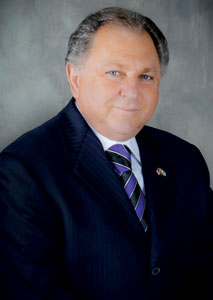 Sam Devinki’s photo will soon be displayed in a prominent spot on the wall at Kehilath Israel Synagogue. That’s because K.I.’s board of directors decided to recognize him for a lifetime of work on behalf of the congregation by bestowing upon him the title of honorary president for life. Two other men have also been given that honor by K.I. — the late Morten Brown and the late Sherman W. Dreiseszun.
Sam Devinki’s photo will soon be displayed in a prominent spot on the wall at Kehilath Israel Synagogue. That’s because K.I.’s board of directors decided to recognize him for a lifetime of work on behalf of the congregation by bestowing upon him the title of honorary president for life. Two other men have also been given that honor by K.I. — the late Morten Brown and the late Sherman W. Dreiseszun.
The congregation will officially give Devinki the honorary title at Shabbat services on Saturday, June 9. A Kiddush hosted by the Devinki, Kolkin and Pack families will follow services.
K.I.’s Rabbi Herbert Mandl said Devinki developed his “feel” for Judaism and Kehilath Israel Synagogue from both his parents, the late Fred and Maria Devinki.
“He has inherited not only his parents’ business sense but also Maria’s big heart and sense of generosity,” Rabbi Mandl said. “This honor could not be bestowed on anyone more deserving than Sam for a lifetime of commitment and love to our synagogue.”
K.I. President Steve Osman said Devinki’s mantra is always what is best for the synagogue.
“Sam is big at leading by example. It is not personal honors he seeks when he donates money. Instead he is demonstrating to others that they should engage in tzedakah by showing them the path he has taken. If he is recognized for an achievement, he hopes that may prompt others to follow his lead,” Osman said.
Devinki said he is incredibly honored to have his name associated with both Brown and Dreiseszun.
“These two guys were icons. They are the guys that kept the synagogue alive in good times and bad over the last 70 years. To have my name considered in the same class as theirs is a big honor, it really is,” Devinki said.
Many would also say Devinki has done a lot to keep the synagogue going over the past 40 years while serving on the board and during two different terms as president — in 1985-86 and again in 2010.
“Whenever there has been a crisis or a need in the synagogue, Sam is there to solve the problem. Sam not only writes a check to fill in the gap when there is one, but he will work whatever project he is needed for at any time,” Rabbi Mandl pointed out in the congregation’s May newsletter.
Devinki’s roots
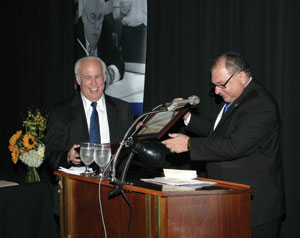 Devinki was born in Ragensberg, Germany, in a displaced persons camp. He and his parents moved to Kansas City in 1950 when he was 4 years old. As they settled into life in Kansas City, the Devinkis joined a local synagogue. But when Devinki was 5 and it was time for him to begin Hebrew school, his parents couldn’t quite afford all the costs associated with that religious education. That’s when K.I.’s Rabbi Maurice Solomon stepped in.
Devinki was born in Ragensberg, Germany, in a displaced persons camp. He and his parents moved to Kansas City in 1950 when he was 4 years old. As they settled into life in Kansas City, the Devinkis joined a local synagogue. But when Devinki was 5 and it was time for him to begin Hebrew school, his parents couldn’t quite afford all the costs associated with that religious education. That’s when K.I.’s Rabbi Maurice Solomon stepped in.
“He told them to come to K.I., and not to worry about what it costs. ‘You can pay what you can,’ he said. As they say, the rest of the story is history. That was in 1951,” Devinki said.
As time went on, Fred and Maria Devinki developed a very personal relationship with Rabbi Maurice and Betty Solomon.
“They were very close. Rabbi Solomon would come to our house to eat,” Devinki said.
Devinki said his parents were devoted to the synagogue, because they “felt like KI was there for them when they needed it.” His own devotion to K.I. is also very personal.
“K.I. was my second home. It was the only other place that I did anything. SYO (the youth group) was my social life. Hebrew school was my educational life other than regular school. Everything I did in life that wasn’t either business related or extended family related was related to K.I. My whole family went there and I had many friends there,” he explained.
Giving back to the community, in Devinki’s case to K.I., is a concept his parents encouraged him and his sisters — Karen Pack and Ida Kolkin — to do by setting a good example.
“They instilled in us tikkun olam, that you have to do for others. I have tried to follow that in my life and I find that every time that I do do something for somebody else, I really get paid back 10 fold. It sounds kind of corny but it’s true. I believe it,” he said.
A dedicated volunteer
The list of projects Devinki has initiated or been a part of at K.I. is extensive. But two hold a special place in his heart. The first is Grand Givers, a program he created in 1977.
“Though laughed at for the concept by many of the past presidents, this program has gone on to be the most successful fundraiser in the history of the synagogue,” Rabbi Mandl said.
Devinki came up with the Grand Givers concept because he literally felt the need for something grand. He noticed that previous fundraisers, such as a Las Vegas night, took a lot of time and effort to plan and execute, yet they only netted about $10,000.
His idea was to sell $100 raffle tickets. He proposed getting 10 people to commit to personally buying and/or selling 10 tickets each. If he was successful in that endeavor, $40,000 would be raised. The raffle winner would receive a brand new car. In 1977 it was a gold Cadillac Eldorado which, Devinki said, Roach Cadillac sold them for an incredible deal of $8,900.
Devinki said he first shared his Grand Givers idea with his mother.
“She told me I was nuts,” Devinki said.
He said he believed in the theory that if he got one guy to agree to it, then others would follow his lead.
“The first guy I went to was Abbott Sher,” Devinki said. “Once I had Abbott, I knew I could get Marty Brown, because they were best friends … it’s a domino effect.”
That very first year Devinki said Grand Givers earned a little more than its $40,000 goal. Anywhere from 300 to 600 people attend the event annually. Over the years it has been tweaked a little. For instance, they no longer give away a car because vehicles today are just too expensive.
“Now we give $10,000 cash as the grand prize,” Devinki said.
Grand Givers was Devinki’s idea, but he quickly credits others for their hard work on the project. For instance he said Dreiseszun became the fundraiser’s biggest supporter, always bringing in “$40,000 to $50,000 worth of tickets every year by himself.”
Always the salesperson, Devinki notes that this year’s Grand Givers is scheduled for Nov. 17 and will feature Rodeo Drive, “a wonderful couple from California who have beautiful voices.”
Over the past 36 years, Devinki estimates Grand Givers has raised, after expenses, more than $3.5 million.
“I think it’s the one thing I’ve done that’s done the most for the stabilization of the synagogue,” he said.
Devinki, who Rabbi Mandl said was the congregation’s youngest ever board member (he was 23 or 24 and still in law school) was also the congregation’s second youngest president. Dreiseszun was 37 years old when he became president. Devinki was 38.
About 15 years ago, Devinki also developed the concept of Tri-Chai, a program where members would contribute $5,400 a year, part of which would be over their normal dues.
“Every synagogue has dues levels and dues at our synagogue are based upon ability to pay, but there are some people who can pay more,” said Devinki, explaining how he came up with the concept.
Rabbi Mandl notes that, “an elite group of individuals has also helped sustain our financial stability.”
Devinki said at the time the concept was developed, it increased K.I.’s budget about 10 percent, “which is a substantial number.”
“Over the years the Tri-Chais haven’t increased as much as I would like but we still have 25 to 30 Tri-Chais in the congregation. I think that’s nice that these people are willing to voluntarily pay more than they are required to pay,” he said.
Even though Devinki is no longer president, he estimates he spends about two hours a day doing things for the synagogue. It’s something he still enjoys, and he appreciates the others who also give their time to the congregation.
“Running a synagogue is not an easy thing. That’s why all those people I’ve mentioned, and so many others, were incredibly devoted guys,” Devinki said. “It takes incredible devotion and I credit all these guys for the work that they’ve done over the years.”
Working for K.I. simply makes Devinki feel good.
“It makes me feel good about myself and that’s why it’s fun to do,” he said. “I love what they call the art of the deal, that’s a Donald Trump term, but I love seeing things develop and grow and come to fruition. When I work for the synagogue, I see things happen. I enjoy that.”
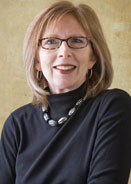 Jewish Employment Services (JES), a joint program of Jewish Family Services and Jewish Vocational Service, has a new entry point for job seekers. The effort is called JumpStart and it’s aimed at getting a smart start on the job search.
Jewish Employment Services (JES), a joint program of Jewish Family Services and Jewish Vocational Service, has a new entry point for job seekers. The effort is called JumpStart and it’s aimed at getting a smart start on the job search.


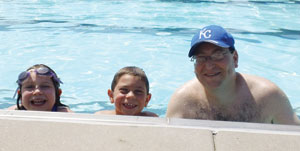
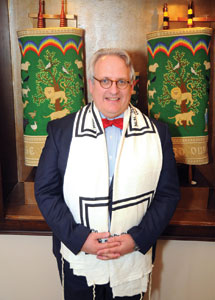 Rabbi Alan Londy believes formal beginnings are important, especially as a way to establish the sacredness of a relationship. His sacred relationship with The New Reform Temple will officially begin Friday night, June 22, when he is installed as the congregation’s rabbi at worship services. The celebration weekend will continue Saturday night at Oakwood Country Club.
Rabbi Alan Londy believes formal beginnings are important, especially as a way to establish the sacredness of a relationship. His sacred relationship with The New Reform Temple will officially begin Friday night, June 22, when he is installed as the congregation’s rabbi at worship services. The celebration weekend will continue Saturday night at Oakwood Country Club.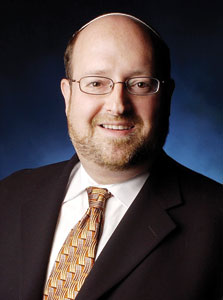 Rabbi Dani Rockoff has been trying to get Rabbi Kenneth Brander to visit Kansas City for three years, since the inception of the Yeshiva University Kansas City Summer Experience internship program began. This year, with two of Rabbi Brander’s children in the program — son Tuvia, leading the group for the third time, and daughter Tehilla as a participant — Rabbi Brander unhesitatingly agreed.
Rabbi Dani Rockoff has been trying to get Rabbi Kenneth Brander to visit Kansas City for three years, since the inception of the Yeshiva University Kansas City Summer Experience internship program began. This year, with two of Rabbi Brander’s children in the program — son Tuvia, leading the group for the third time, and daughter Tehilla as a participant — Rabbi Brander unhesitatingly agreed.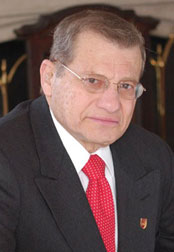 Barnett C. Helzberg Jr. was fortunate to have a mentor, and a famous Kansas City businessman at that. That mentor was Ewing Marion Kauffman, affectionately known as Mr. K, the founder of Marion Laboratories and owner of the Kansas City Royals.
Barnett C. Helzberg Jr. was fortunate to have a mentor, and a famous Kansas City businessman at that. That mentor was Ewing Marion Kauffman, affectionately known as Mr. K, the founder of Marion Laboratories and owner of the Kansas City Royals.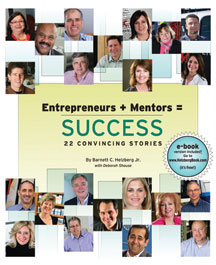 Readers will recognize the names of many members of the Jewish community mentioned in the book. At least two Jewish mentees, Joe Lieberman and Missy Love, have their stories featured.
Readers will recognize the names of many members of the Jewish community mentioned in the book. At least two Jewish mentees, Joe Lieberman and Missy Love, have their stories featured.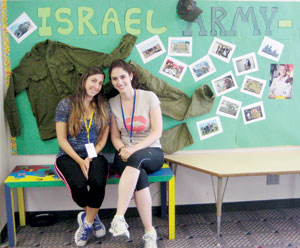 Every summer the Jewish Community Center brings an Israeli emissary here to teach campers at its Barney Goodman Camp. This year not one but two shlichot (female emissaries) will be on staff. Ma’ayan Osher-Levinger and Paz Riecher arrived here the last week in May and will remain through the last day of camp, which is Aug. 3.
Every summer the Jewish Community Center brings an Israeli emissary here to teach campers at its Barney Goodman Camp. This year not one but two shlichot (female emissaries) will be on staff. Ma’ayan Osher-Levinger and Paz Riecher arrived here the last week in May and will remain through the last day of camp, which is Aug. 3.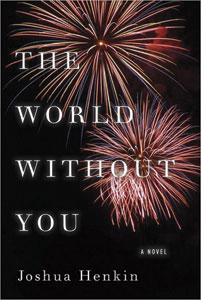 “The World Without You: A Novel” by Joshua Henkin (Pantheon, 2012)
“The World Without You: A Novel” by Joshua Henkin (Pantheon, 2012) 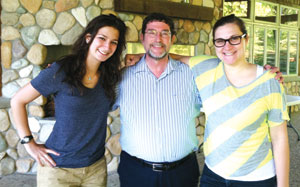 KC SONG LEADERS — Several people with ties to The Temple, Congregation B’nai Jehudah, got together at Hava Nashira, the song leaders’ workshop held annually at Olin Sang Ruby camp in Wisconsin. It’s a program for training song leaders, music teachers, rabbis, cantors and music specialists in leading Jewish music in camps, congregations, community centers and other types of Jewish programming and was founded in 1992 by the late Debbie Friedman, Cantor Jeff Klepper and Jerry Kaye, director of the Olin-Sang-Ruby Union Institute Camp in Oconomowoc, Wis. There were more than 250 participants this year including three participants and one faculty member who were all confirmed at B’nai Jehudah. Rabbi Larry Karol (confirmed 1970), who is now the rabbi of Temple Beth-El, Las Cruces, N.M., was on staff. Rachael Klein (confirmed 2007) is beginning studies at Hebrew Union College-Jewish Institute of Religion in Jerusalem; Bess Wohlner (confirmed 2000) is a fourth-year rabbinical student at HUC-JIR in Los Angeles; and Rabbi Ken Chasen (confirmed 1981) is a rabbi at Leo Baeck Temple in Los Angeles.
KC SONG LEADERS — Several people with ties to The Temple, Congregation B’nai Jehudah, got together at Hava Nashira, the song leaders’ workshop held annually at Olin Sang Ruby camp in Wisconsin. It’s a program for training song leaders, music teachers, rabbis, cantors and music specialists in leading Jewish music in camps, congregations, community centers and other types of Jewish programming and was founded in 1992 by the late Debbie Friedman, Cantor Jeff Klepper and Jerry Kaye, director of the Olin-Sang-Ruby Union Institute Camp in Oconomowoc, Wis. There were more than 250 participants this year including three participants and one faculty member who were all confirmed at B’nai Jehudah. Rabbi Larry Karol (confirmed 1970), who is now the rabbi of Temple Beth-El, Las Cruces, N.M., was on staff. Rachael Klein (confirmed 2007) is beginning studies at Hebrew Union College-Jewish Institute of Religion in Jerusalem; Bess Wohlner (confirmed 2000) is a fourth-year rabbinical student at HUC-JIR in Los Angeles; and Rabbi Ken Chasen (confirmed 1981) is a rabbi at Leo Baeck Temple in Los Angeles. Sam Devinki’s photo will soon be displayed in a prominent spot on the wall at Kehilath Israel Synagogue. That’s because K.I.’s board of directors decided to recognize him for a lifetime of work on behalf of the congregation by bestowing upon him the title of honorary president for life. Two other men have also been given that honor by K.I. — the late Morten Brown and the late Sherman W. Dreiseszun.
Sam Devinki’s photo will soon be displayed in a prominent spot on the wall at Kehilath Israel Synagogue. That’s because K.I.’s board of directors decided to recognize him for a lifetime of work on behalf of the congregation by bestowing upon him the title of honorary president for life. Two other men have also been given that honor by K.I. — the late Morten Brown and the late Sherman W. Dreiseszun. Devinki was born in Ragensberg, Germany, in a displaced persons camp. He and his parents moved to Kansas City in 1950 when he was 4 years old. As they settled into life in Kansas City, the Devinkis joined a local synagogue. But when Devinki was 5 and it was time for him to begin Hebrew school, his parents couldn’t quite afford all the costs associated with that religious education. That’s when K.I.’s Rabbi Maurice Solomon stepped in.
Devinki was born in Ragensberg, Germany, in a displaced persons camp. He and his parents moved to Kansas City in 1950 when he was 4 years old. As they settled into life in Kansas City, the Devinkis joined a local synagogue. But when Devinki was 5 and it was time for him to begin Hebrew school, his parents couldn’t quite afford all the costs associated with that religious education. That’s when K.I.’s Rabbi Maurice Solomon stepped in. Breast cancer survivor and Grammy-winning artist Sheryl Crow is headlining a benefit for Back in the Swing at 8 p.m. Saturday, July 14, at the Johnson County Community College’s Yardley Hall. The musician, mother and Missouri native will perform select songs from her legendary career and share personal reflections from the heart. Merry and Ed Prostic and Sherry and Gary Forsee are serving as honorary chairmen of the event.
Breast cancer survivor and Grammy-winning artist Sheryl Crow is headlining a benefit for Back in the Swing at 8 p.m. Saturday, July 14, at the Johnson County Community College’s Yardley Hall. The musician, mother and Missouri native will perform select songs from her legendary career and share personal reflections from the heart. Merry and Ed Prostic and Sherry and Gary Forsee are serving as honorary chairmen of the event.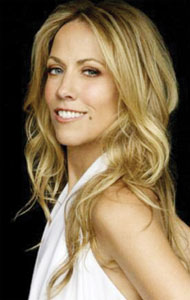 The book, according to Unell, features more than 500 “fascinating pieces of research” on everything from prevention of primary breast cancer to preventing the occurrence of breast cancer. It also gives tips on bone health and heart health and others areas concerning women’s health.
The book, according to Unell, features more than 500 “fascinating pieces of research” on everything from prevention of primary breast cancer to preventing the occurrence of breast cancer. It also gives tips on bone health and heart health and others areas concerning women’s health.